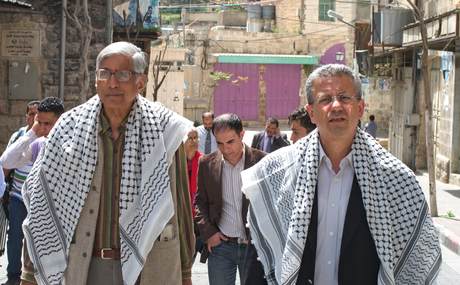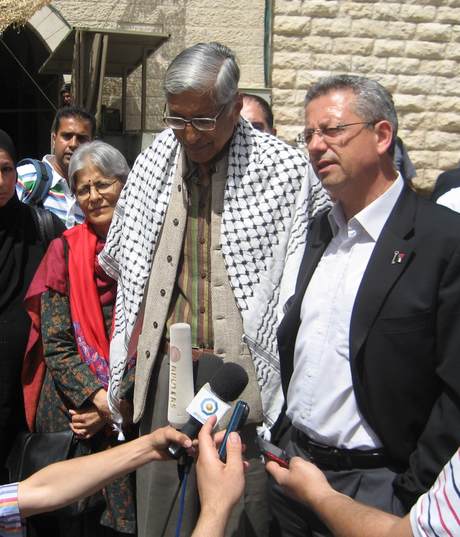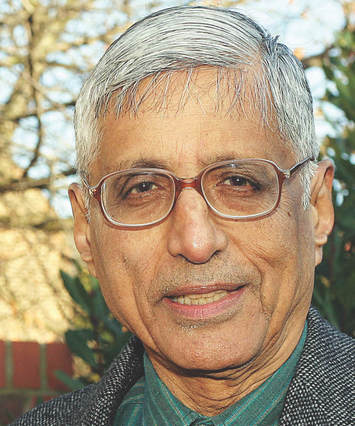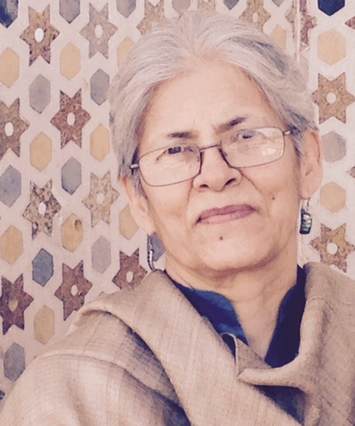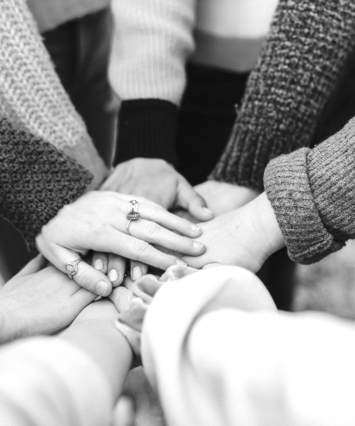As part of their journey to several countries, Prof Rajmohan Gandhi and his wife Usha visited the West Bank and Israel at the beginning of April. Along with Edward Peters they were guests of Dr Mustafa Barghouthi and the Palestinian National Initiative in the West Bank before continuing to Jerusalem for 24 hours.
The wider context of the visit was a growing awareness of non-violence as a valid approach to achieving peace in the region. “Something is stirring in the West Bank,” wrote Ethan Bronner in the New York Times on April 6. “With both diplomacy and armed struggle out of favor for having failed to end the Israeli occupation,” a ‘third way’ was emerging, he said, which was ‘avoiding violence’.
The Gandhis’ host, Dr Barghouthi, was earlier this year nominated for the Nobel Peace Prize in recognition of his consistent advocacy of non-violence in the Palestinian struggle for independence, and because of his work with the Palestinian Medical Relief Society which he co-founded in 1979. Writing in the Financial Times on April 5, Dr Barghouthi said: “...colleagues and I have sought to marshal the power of non-violent direct action against Israel’s occupation and apartheid system to highlight the injustice of its actions and encourage Israelis and American Jews to see that we do not oppose them but the actions of the Israeli government.”
Dr Barghouthi, who is Secretary General of the Palestinian National Initiative, personally gave the Gandhis a full-day tour of parts of the West Bank in order to obtain a picture of the situation. The Gandhis were shown around the city of Hebron where they saw at first hand the impact of Israeli settlements on the local population. At the historic site of the grave of Abraham, the Ibrahimi Mosque, a major holy place for both Jews and Muslims, Dr Barghouthi and the Gandhis peacefully passed through a road block in spite of efforts by two Israeli soldiers to prevent them. They greeted Palestinian shopkeepers whose shops lie in land now cut off from their community before returning to the secure compound to visit the Mosque itself. This incident was widely reported in Middle Eastern media.
The Gandhis met with friends and associates of the Palestinian National Initiative and Medical Relief Association before proceeding to Bethlehem to visit the Church of the Nativity on the site of the birthplace of Jesus. They then travelled to the villages of Ni’lin and Bil’in, west of Ramallah, which have been at the forefront of resistance to Israeli seizure of land. They met with local citizens including the brother of a young man killed during a demonstration.
At a press conference in Ramallah next day, and at a public meeting the same afternoon, Prof Gandhi repeated the observations he had made in different places where he had spoken the day before.
“The settlements, walls and separating roads loom larger and more oppressively than I had imagined,” he said. “They intrude everywhere and dominate the landscape. Facing the settlements, I find it hard to believe that the government of Israel is serious when it talks of wanting an independent Palestinian state. These settlements, walls and separating roads will obstruct the creation of a Palestinian state.
“The government of Israel has used fear – genuine fear – to pursue a policy of domination and expansion.
“The range of Palestinian non-violent activity against occupation,” said Prof Gandhi, is also “larger, and richer in creativity, than I had imagined. The work being done by Palestinians for strengthening civil society – through educational and public health programs – is also much stronger than I had realized.
“Many Palestinians I have met seem to hold both weapons in their hands – in one hand the weapon of non-violent resistance and in the other the weapon of constructive work.”
This observation was borne out by Ethan Bronner in the New York Times story of April 6. “The current set of campaigns,” he wrote, “is trying to incorporate peaceful pressure in limited ways. Rajmohan Gandhi, grandson of the Indian independence leader Mahatma Gandhi, just visited Bilin, a Palestinian village with a weekly protest march.”
During his visit Prof Gandhi returned repeatedly to the subject of justice. “Injustice anywhere is injustice everywhere,” he said. “Mandela declared that the liberation of South Africa is incomplete without the liberation of Palestine. I would say the same about the liberation of India and Pakistan.
“Every person, people, race and nation will one day have to face the justice of history, the justice of the Almighty.
“I become smaller in my own eyes if I don’t fight for justice. Also, I will meet my Maker one day, who will want to know whether or not I raised my voice for justice.”
Prof Gandhi declared that it was “the duty of the international community… to mobilize support for the just demands of the Palestinians.
“I don’t know why a just cause remains short of victory for a long time. I cannot shake the Almighty to act. But I can disturb the sleep of the international community.” It should put pressure on the government of Israel. And it should “appeal to the sense of justice in Judaism, it should rouse Judaism’s conscience.”
Prof Gandhi paid tribute to “the many in Israel, and the many Americans of Jewish origin, who fight for Palestinian rights”.
“On Easter Sunday, I had the amazing privilege of being in two sacred places, the place of worship in Hebron at the grave of Abraham, and the place of worship in Bethlehem where Jesus was born. In both places I prayed silently for two things: for the liberation of Palestine and for the well-being of my Jewish friends in Israel and in the USA.”
At a packed public meeting in Ramallah, to which people came from many parts of the West Bank, Prof Gandhi spoke of his grandfather’s strategies and of one of the Mahatma’s closest colleagues Khan Abdul Ghaffar Khan who had said that the word that appears in the Qur’an more often than almost any other is ‘patience’.
Prof Gandhi offered his audience a few ‘suggestions’. “Firstly, be patient. Second, never give up your faith in victory. The Soviet Union crumbled, apartheid in South Africa crumbled, the occupation of Palestine will also crumble. Then also, be appreciative of one another. Instead of blaming a colleague for what is not done, appreciate what is done. Live to make the other person great. Then your team will become stronger, your cause will prosper, and your greatness will also be seen. But if your concern is to make yourself great, your team will weaken.
“Fourth, continue the constructive work. Build the Palestinian home. Make everything you do of the highest quality. Fifth, continue to laugh amidst hardship. Next, enlarge the nonviolent struggle. And lastly, strengthen the friendship and partnership of Palestine’s Muslims and Christians. Let Palestine become an example of a country where the rights of all minorities are fully respected.”
After crossing to Jerusalem, the Gandhis had 50 minutes with Israeli President Shimon Peres who received them in the President’s House in West Jerusalem. Prof Gandhi gave the background to his visit, supporting in his role as IofC President the work of teams in several countries, and details of the visit to the West Bank as guest of Dr Mustafa Barghouthi.
The President responded to observations on the situation there by explaining the security considerations Israel faces.
“The recovery after the Holocaust of the Jewish people,” Prof Gandhi told the President, “is one of the noblest, most stirring chapters in the story of humankind. I pray for another chapter in this story, a chapter where justice is provided to the Palestinians.”
English

